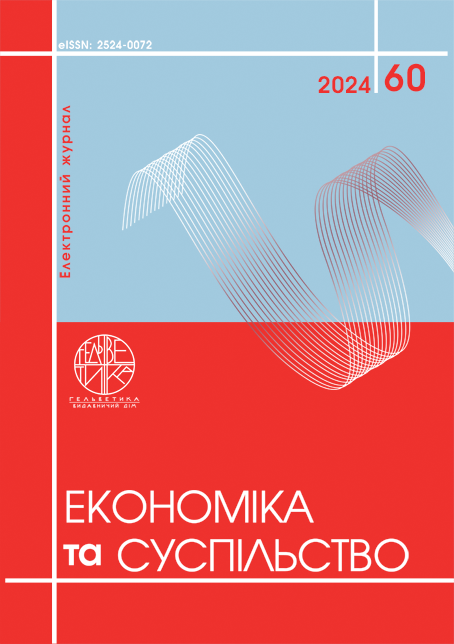PUBLIC ADMINISTRATION AS A STRATEGIC TOOL FOR ENSURING SUSTAINABLE DEVELOPMENT OF TERRITORIES
Abstract
The article explores the main problematic issues of institutional foundations of public administration in ensuring sustainable development of territories in the context of crisis situations. It has been clarified that by granting governance powers to local self-government bodies in the process of implementing decentralization reforms, the state strategy was aimed at implementing new approaches to regional policy, which involve stimulating local communities to increase their own competitive potential through: innovative, investment, inclusive development; financial decentralization; rational management of resource sources and implementation of environmental measures, and more. It is emphasized that to achieve sustainable development of territorial communities, it is necessary to identify their resource base and balance the economic, social aspects of economic entities, carefully analyze the situation in various sectors of the economy. The importance of strategic planning as a lever for creating systemic potential necessary to achieve the goals of territorial strategic development is emphasized. Therefore, the strategic instruments of public administration in ensuring sustainable territorial development should include: increasing the efficiency of the economic potential of the territory, the ability to ensure full employment of the able-bodied population, improving the standard of living of the inhabitants, and addressing environmental issues. Achieving the goals of sustainable development for territorial communities should be viewed through the prism of cooperation among the public sector, civil society organizations, and business structures. Priority directions of public administration on the path to ensuring the capability of territorial communities for their own sustainable development should include decisions regarding the rational use of productive, natural, labor, financial, and investment resources, interaction with local economic entities, ensuring ecological sustainability, and enhancing potential through the expansion of innovation and investment projects.
References
Лупенко Ю.О., Малік М.Й., Булавка О.Г. Стратегічні напрями сталого розвитку сільських територій на період до 2030 року. Київ : ННЦ ІАЕ. 2020. 60 с.
Мовчанюк А.В. Концептуальні основи реформування системи державного управління в Україні. Публічне управління та митне адміністрування. № 2 (25). 2020. С. 20 – 24.
Про місцеве самоврядування : Закон України від 21.05.1997 № 280/97 URL: https://zakon.rada.gov.ua/laws/show/280/97-%D0%B2%D1%80
Про Цілі сталого розвитку України на період до 2030 року: Указ Президента України від 30.07.2019 № 722/2019 URL: https://zakon.rada.gov.ua/laws/show/722/2019
Про затвердження Державної стратегії регіонального розвитку на 2021-2027 роки: Постанова Кабінету міністрів Україні від 05.08.2020 №695 URL: https://zakon.rada.gov.ua/laws/show/695-2020-%D0%BF
Стратегія сталого розвитку «України – 2020» : Указ Президента України від 12.10.2015 № 5/2015 URL: https://zakon.rada.gov.ua/laws/show/5/2015
Світовий О.М., Мовчанюк А.В., Дяченко М.І. Реформування адміністративно-територіального устрою в умовах децентралізації влади: проблеми та перспективи. Право та державне управління. № 3. 2020. С.157-161. DOI: https://doi.org/10.32840/pdu.2020.3.23
Patyka N., Sokolova A., Movchaniuk A., Sysoieva I., Khirivskyi R. Ukraine’s rural areas in the conditions of decentralization and local self government reform: challenges and prospects. Agricultural and Resource Economics. 2023. Vol. 9. № 3. Pp. 266–295. DOI: https://doi.org/10.51599/are.2023.09.03.12.
Lupenko Y.O., Malik M.Y. & Bulavka O.G. (2020) Stratehichni napriamy staloho rozvytku silskykh terytorii na period do 2030 roku. [Strategic directions of sustainable development of rural areas until 2030]. Kyiv: NNC IAE. 60 p. (in Ukrainian).
Movchaniuk, A. V. (2020) Kontseptual’ni osnovy reformuvannya systemy derzhavnoho upravlinnya v Ukrayini [Conceptual basis of reforming public administration system in Ukraine]. Public Administration and Customs Administration, vol. 2 (25), pp. 20–24. (in Ukrainian).
Pro mistseve samovriaduvannia : Zakon Ukrainy vid 21.05.1997 № 280/97 [On local self-government: Law of Ukraine (May 21, 1997)]. Available at: https://zakon.rada.gov.ua/laws/show/280/97-%D0%B2%D1%80 (in Ukrainian).
Pro Tsili staloho rozvytku Ukrainy na period do 2030 roku: Ukaz Prezydenta Ukrainy vid 30.07.2019 № 722/2019 [About the Sustainable Development Goals of Ukraine for the period until 2030 : Decree of the President of Ukraine. (July 30, 2019)]. Available at: https://zakon.rada.gov.ua/laws/show/ 722/2019 (in Ukrainian).
Pro zatverdzhennia Derzhavnoi stratehii rehionalnoho rozvytku na 2021-2027 roky: Postanova Kabinetu ministriv Ukraini vid 05.08.2020 №695 [On the approval of the State Strategy for Regional Development for 2021-2027: Resolution of the Cabinet of Ministers of Ukraine (August 05, 2020)]. Available at: https://zakon.rada.gov.ua/laws/show/695-2020-%D0%BF (in Ukrainian).
Stratehiia staloho rozvytku «Ukrainy – 2020» : Ukaz Prezydenta Ukrainy vid 12.10.2015 № 5/2015 [Sustainable Development «Strategy Ukraine's 2020» : Decree of the President of Ukraine (October 12, 2015)]. Available at: https://zakon.rada.gov.ua/laws/show/5/2015 (in Ukrainian).
Svitovyi, O.M., Movchaniuk, A.V., & Dyachenko, M.I. (2020) Reformuvannia administratyvno-terytorialnoho ustroiu v umovakh detsentralizatsii vlady: problemy ta perspektyvy. [Reforming the administrative-territorial system in conditions of decentralization of power: problems and prospects]. Law and public administration, vol. 3, pp.157–161. DOI: https://doi.org/10.32840/pdu.2020.3.23 (in Ukrainian).
Patyka, N., Sokolova, A., Movchaniuk, A., Sysoieva, I., & Khirivskyi, R. (2023). Ukraine’s rural areas in the conditions of decentralization and local self-government reform: challenges and prospects. Agricultural and Resource Economics: International Scientific E-Journal, 9(3), 266–295. DOI:https://doi.org/10.51599/are.2023.09.03.12

This work is licensed under a Creative Commons Attribution 4.0 International License.


